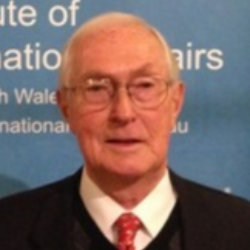GEOFF MILLER; Whatever Happened to North Korea?
December 16, 2018
There was a lot of scepticism about the Singapore summit between Trump and Kim and what it might produce, but some sort of process between North Korea and the US seemed the logical next step. However, while further summits between North and South Korea have taken place, and there has been actual progress between the two and plans for more, nothing appears to be happening at a senior level between the Unites States and North Korea. And in the absence of such movement the whole North Korean issue, so recently the centre of world attention, has been well and truly relegated to the back pages by the China-US dramas, Trumps and Mrs Mays troubles and other events.
In one sense of course this is not bad, because what could have been happening includes further nuclear and missile tests by North Korea, and responses by the US. But in the absence of further progress one wonders how long this relatively benign situation will continue. And in the meantime planned or contemplated activities are being cancelled or not taking place. For example a planned recent meeting in the US between US Secretary of State Pompeo and senior Kim adviser Kim Yong Chol did not take place, and it seems that a visit by Kim to Seoul for a further summit with Moon, planned for before Christmas, will not happen.
On the other side of things, on December 10 the US Treasury Department announced that it was imposing sanctions on three senior North Koreans, including the vice chairman of the Central Committee of the (North) Korean Workers Party, Choe Ryong-hae, and the Minister for State Security, Jong Kyong-thaek, for human rights abuses. At almost the same time North Koreas state-run newspaper, Rodong Sinmun, described another US funding ban on North Korea as a heinous act of hostility that runs contrary to the spirit of the North Korea-US summit in Singapore, claiming that the US needs to quickly get out of the rut of hostility and confrontation.
It seems clear that what is going on is an absolute clash of expectations about what would and should happen after the Singapore summit. Despite the atmospherics between Trump and Kim in Singapore the US has stuck to its demand for complete, verifiable and irreversible (nuclear) disarmament by North Korea before economic sanctions begin to be lifted. North Korea had clearly hoped that in practice the Chinese formula of step-by-step, reciprocal moves or concessions would apply, expecting or at least hoping that its moves in ceasing nuclear tests and missile launches and decommissioning some nuclear and missile sites would result in an easing of economic sanctions—important if North Koreas declared intention to re-direct its priorities to economic development is to be successful.
However that hasnt happened. In response, according to an experienced American non-proliferation expert, Robert Einhorn, the North Koreans have concluded that they should concentrate their efforts on President Trump, in the belief that he is more flexible than any of his senior advisers, and have declined to engage with either Secretary Pompeo or the senior official designated by the US to lead in official-level talks with North Korea, Steve Beigun. Einhorn thinks this is unwise, but actions like the imposing of sanctions on North Korean officials referred to above do give the impression that President Trump and his administration arent on the same page, to quote another American commentator. (There may also be a personal aspect to the North Korean attitude: there have been media reports that Kim Yong Chol, Kims closest adviser on these issues, because of encounters in the early 2000s cant stand John Bolton, now Trumps National Security Adviser and an early proponent of the USs hard-line position on North Korean disarmament.)
So what will happen? At least pending the personal re-engagement of Trump it seems that the US stance will be dominated by the hard-liners and the fear of being taken for a ride by North Korea, dismantling the sanctions regime in exchange for measures that prove to be neither complete nor irreversible. But, according to a senior South Korean official, in the absence of further demonstrations of US goodwill—such as an easing of sanctions, or progress on the formal ending of the still-existing state of war—North Korea doesnt trust US promises enough to take bold steps towards denuclearisation (which could well be the subject of debate and contention within North Korean ruling circles).
There are plenty of proposals about what a step-by -step, reciprocal process might look like, and calls, including from within the US, for the US to put forward something symbolic to break the current deadlock. But as yet there are no signs of this happening. In this situation it is worth remembering that North Korea has a history of taking dramatic actions when it feels its concerns arent getting the desired attention. And it would be a great pity if all that has been achieved after the improbable Singapore summit, particularly between South and North Korea, were to founder because of rigid positions on the part of the US and the North.
Geoff Miller is a former Australian diplomat and government official, and an Ambassador to the Republic of Korea.
